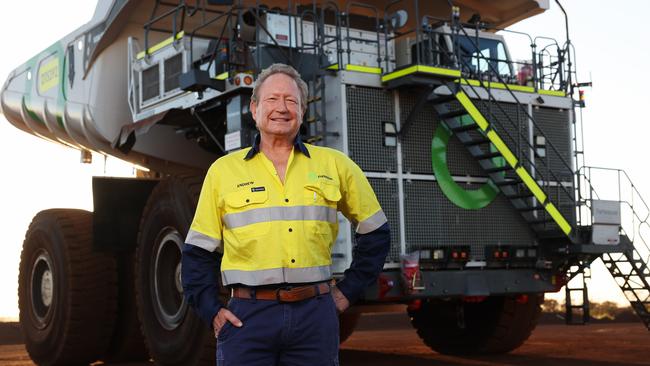Carbon offsets a waste of money that don’t cut emissions, says Fortescue
Iron ore giant Fortescue will no longer buy voluntary carbon offsets, raising doubts over their effectiveness.

Iron ore giant Fortescue will no longer buy voluntary carbon offsets, citing doubts over their effectiveness in cutting emissions, in the latest backlash by an Australian corporate against the booming industry.
“Fortescue will no longer buy voluntary carbon offsets unless required by law, as offsets have been shown to be troubled by extensive concerns about quality, lack of additionality and an inability to deliver real reductions in emissions,’’ the company said in its annual report.
Fortescue’s shift, which has been underway since September last year, mirrors moves by other large corporates such as Telstra, which announced in June it would also stop using offsets in favour of direct action to reduce emissions.
Telstra was, until then, the largest single participant in the government’s Climate Active carbon-neutral labelling program, which is currently under review.
The telco, speaking with The Australian in June, shied away from criticising carbon offsets. BHP and Woolworths have also moved away from offsets.
Companies in the past have offered products that are “carbon neutral’’, based on the fact that consumers or the company itself had bought carbon offsets sufficient to offset the emissions from the product’s production.
The trend now is to focus on reducing actual emissions rather than buying financial instruments to offset them. However, for many companies there is a level beyond which it is difficult to abate, and offsets remain useful.
Fortescue, founded by Andrew Forrest, is aiming for what it calls Real Zero, which involves using no fossil fuels or offsets in its Scope 1 and 2 emissions profiles.
“Fortescue has a plan to decarbonise our Australian terrestrial iron ore operations (Scope 1 and 2) in the Pilbara by 2030,’’ the company says.
“We have identified the solutions needed to eliminate approximately 90 per cent of terrestrial ... emissions from our Australian iron ore operations and are actively working to identify solutions for the final approximately 10 per cent.’’
Macquarie, in a research note entitled “Carbon neutral no more’’, points out that Google recently announced it was no longer maintaining operational carbon neutrality, having bought three million tonnes of offsets in 2022, while Shell has withdrawn its carbon offset targets and several airlines including Delta, Easy Jet and JetBlue have canned their carbon neutral schemes.
Macquarie says this is being driven by both credibility concerns and regulatory scrutiny.
“In January the European Union parliament approved new regulation, under which, carbon offsets will not be allowed to contribute to product carbon neutrality claims from 2026,’’ Macquarie says.
“There are also currently negotiations between the EU member states and parliament on the use of offsets for company carbon-neutral claims.
“In Australia, there is a strategic review of the Climate Active certification under way, with proposals to drop the term carbon-neutral and tighten the use of offsets.’’
Macquarie says at the moment, 25 per cent of the companies in the ASX100 claim carbon neutrality or have a carbon-neutral target, and 7 per cent have a carbon-neutral product.
“Given greater scrutiny and greenwashing concerns, we may see a decline in the percentage of Australian companies offering carbon-neutral products or using carbon offsets to reach carbon-neutral targets, particularly from companies which are using a large volume of international offsets,’’ Macquarie says.
Macquarie says there are particular quality concerns around international offsets, and says almost 80 per cent of the offsets used by Australian listed companies under the Climate Active scheme were international.
“Globally, according to a Bain & Company survey of 137 global companies in the fourth quarter of 2022, less than 25 per cent of corporate respondents plan to use carbon offsets despite more than 90 per cent having a net zero/carbon-neutral target by 2050,’’ Macquarie said.
“It was flagged that more than 50 per cent of corporate respondents attributed their unwillingness to participate in the voluntary carbon market to market imperfections and a lack of transparency on climate impact and quality. Further, about 40 per cent of companies had concerns regarding reputational as well as legal risk.’’
In Australia, Macquarie said that while voluntary demand for Australian Carbon Credit Units (ACCU) grew by 21 per cent over the year to the end of March, more than half of the trade in Australian credits was being pushed by the Safeguard Mechanism’s requirements, “and will likely be used by Safeguard entities to meet compliance obligations as Safeguard baselines decline’’.
The ACCU spot price had remained stable at around $34 per tonne, however, indicating that Safeguard-driven demand was not yet pushing prices higher.
Last year, the Albanese government announced a review of the Climate Active certification, originally introduced in 2017 and rebranded in 2019, with proposed updates including removing the term “carbon-neutral” and implementing stricter requirements.






To join the conversation, please log in. Don't have an account? Register
Join the conversation, you are commenting as Logout